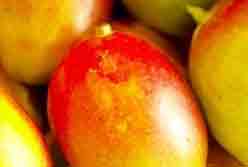Do Mangoes raise blood sugar among people having diabetes?
All fruits have fructose and they are converted into glucose in the gut, and absorbed as glucose. Doctors will tell you not to eat too many fruits if you have diabetes as your anti-diabetic medication will not be able to normalise blood sugar levels.
Mangos seem to be an exception to the rule. About half of the sugar content in mangoes comes from sucrose. White table sugar is sucrose. Sucrose is generally added to process junk foods as a sweetener. There is less fructose in mangoes than most other fruits. Only about one third of the sugar is in the form of fructose. The remaining sugar in mangoes is dextrose. It is dextrose that’s given intravenously to patients in hospital to provide energy, water and electrolytes. Dextrose is a simple molecule of glucose combined with water. All these sugars seem to have the same effect on the body.
Mangoes also have a small amount of starch a complex form of carbohydrates. Starch s not sugar, but eventually it is converted into glucose in the gut and absorbed as glucose. This being a slow process may not have glucose spikes in your blood.
Mangoes belong to the family of Anacardiaceae. India seems to grow the most mangoes producing more than 18 million tons per year. In Queensland in Australia mango trees grow on the sides of the roads, and many fruits are seen on the ground half eaten by the birds. Still most of the mangoes sold in supermarkets come from Queensland.
Mangoes have a variety of vitamins and minerals, such as vitamin C, A, E Kandi vitamin B’s. They also have polyphenols, triterpene and lupeol being active as antioxidants and have anti-inflammatory effects.
Regulating blood sugar
Mangoes for some reason seems to regulate your sugar level, in spite of having sugars mentioned earlier. A study published in Nutrition and Metabolic Insights describes the positive effects in blood sugar levels in mice.
Further trials on humans reveal similar outcomes. The study used twenty obese individuals, each was given 10 grams of ground freeze dried mango pulp per day for 12 weeks and the researchers found that glucose levels were reduced in both males and females who consumed mangoes on the trials. These obese individuals showed no surprising effects on the body weight.
The authors concluded that, there findings indicate that regular consumption of freeze-dried mango by obese individuals does not negatively impact body weight but provided a positive effect on fasting blood glucose. The researchers believe that the mangoes may stimulate the pancreatic beta cells to secrete insulin, responsible for lowered blood sugar.
Effect on pre-diabetes
Another study on pre-diabetics was given 10 grams of freeze dried mango for 12 weeks. The authors found the results showed decreased blood glucose and increased insulin levels when compared with the control group who did not eat mango.
Conclusions: It is good to include mangoes to a healthy diet being beneficial for blood sugar levels, but further studies are required to prove these findings.
The proof of the pudding is to check your blood glucose level before and after eating a fresh mango, if you have diabetes, two hours later, and if it has a positive effect in lowering your blood sugar you are a winner.
Good advice by Dr harold
Some ref: to SF GATE









No Comments